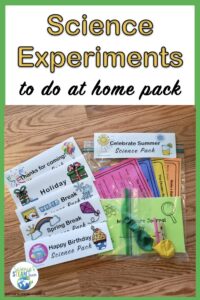Why Encourage Families to Engage in Science at Home
Many parents think that science is a “hard” subject. They may not have had formal science until middle or high school. It might have been difficult for them. Consequently, our job as educators is to get families comfortable with science and the language of science. Studies show that children who have parents and caregivers that engage in science discussions and activities have better success in school. The Global Family Research Project out of Boston, MA, seeks ways to get all families involved in their child’s education. Specifically, this project ran several STEM projects to assist students in the areas of science, technology, engineering, and math. These included after school programs, summer programs, and programs in public libraries.
Subsequently, after participating in one of these STEM programs with their child, two family engagement findings stand out:
- “90% of families discussed science more often, watched more science shows, and read more science books at home.”
- “65% engaged in more science activities, such as building things, playing with science kits, and going to museums and zoos.”
So, wouldn’t it be great if we can get results like this by showing parents what they can to encourage science at home?!
Engaging in Science Activities at Home isn’t Hard!
Kids are naturals at noticing things, exploring, and talking about experiences in their everyday lives. They love to make things and play. One of my favorite quotes by Albert Einstein is “Play is the highest form of research.” This is so true! Before the age of one, children learn about cause and effect, probability, and more! Babies learn that shaking a rattle will produce noise. They know that if they cry someone will come running! Two-year-olds are constantly asking, ” Why?”, “What?”, and “How?” questions. Older children ask even more questions about the things they observe. Thus, we need to teach families how to take their child’s lead and ask thoughtful questions that can help shape their learning.
Questions for Families to Ask Their Children That Promote Science Learning
Parents need to know what questions to ask. We can help them with that by modeling and giving them a list of a few simple questions. Of course, the best questions to encourage scientific thinking are open-ended. Start with something your child is interested in. For example, my son brought this frog to show me. I could ask him the following questions:
Can you describe your frog to me?
What patterns do you notice?
What do you notice about his feet?
I wonder why his feet are webbed?
Why do you think that?
How can we find out more about frogs?
The bolded sentence starters can be used in so many situations. You might also like our post about Accountable Talk in STEAM Classes.
Everyday Activities that Lead to Science Learning with Families
Exploring the outdoors (think plants, animals, the night sky, the clouds, shadows, camping, hiking)
Taking care of pets
Playing on a playground or playing a game like kickball (think balance, forces, and motion)
Cooking (nothing like a little math and chemistry in the kitchen)
Building or creating something (cardboard boxes, blocks, Legos, crafts)
Talking about how things work (TV to the toilet)
Repairing things (think bikes, pool floats, leaks)
Playing with water
Going to a park, nature center, museum, or zoo
Reading science-related books (There are so many great ones!)
Watching science-related shows and videos (Here are just a few.)
PBS Kids Programs like Ready, Jet, Go, and Ruff Ruffman, are perfect!
Peekaboo Kidz has lots of videos. Crash Course Kids videos are for kids a little bit older.
Looking up answers to your child’s questions on science websites directed at children
Ducksters: Science for Kids, and National Geographic Kids
Science Experiments at Home
Kids and adults all love science experiments! Many experiments can be done at home using common household materials like baking soda, vinegar, dye, etc. There are many websites that offer experiment ideas and directions. Here are just a few: Science Kids, Science Fun, Science Bob, and Go Science Girls.
I have developed a science experiment packet for teachers to use with families. This resource contains 10 science experiments and 3 STEM challenges. Each of the activities comes with explicit instructions and requires materials that most people have in their homes.
Science Home Tools
Personally, I don’t think that it’s necessary to have specific science tools at home. If parents ask you for ideas, I would recommend a magnifying glass, something for holding small critters for a short time, and some magnets!
(We are Amazon Affiliates and so get a very small cut of the purchase price. This doesn’t affect your price. Being affiliates allows us to share things that can benefit your students.)
Most of all, parents should just have fun playing with their kids!
And remember, it’s all science!









One Comment